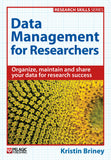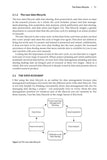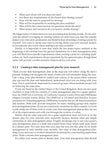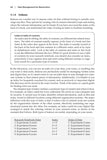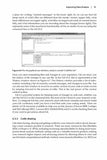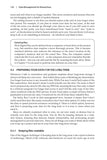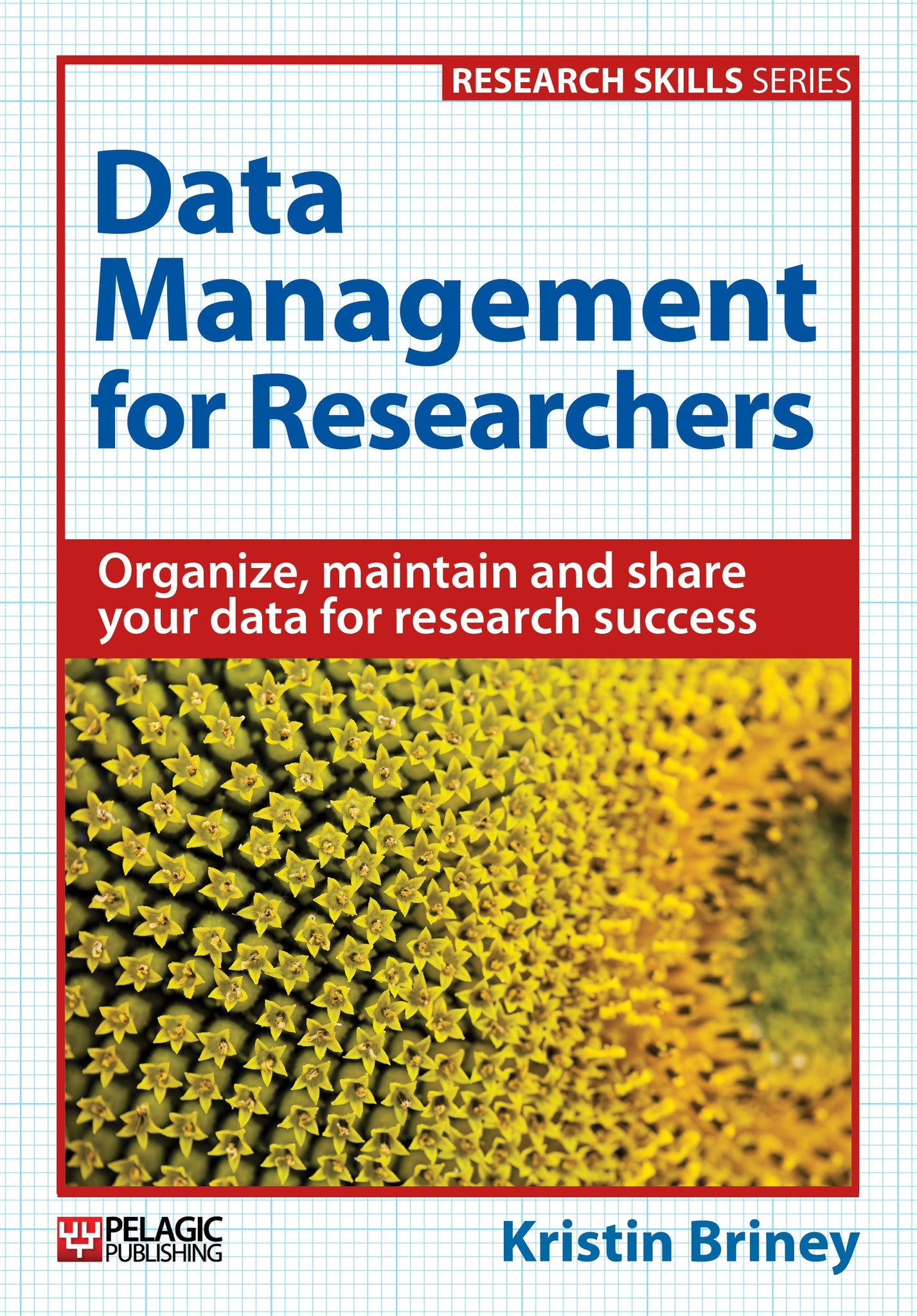
Data Management for Researchers
Organize, maintain and share your data for research success
- A comprehensive guide to everything researchers need to know about data management and curation.
- Will allow researchers to understand and achieve the goal of better research management and how to organize, document, use and reuse their data.
- Relevant to those conducting academic research in any subject.
- An excellent practical treatise on the art and practice of data management, this book is essential to any researcher
—Robert Buntrock, Chemical Information Bulletin
- data analysis
- data management
- data sharing
- data storage
- professional development
- statistics
Description
A comprehensive guide to everything scientists need to know about data management, this book is essential for researchers who need to learn how to organize, document and take care of their own data.
Researchers in all disciplines are faced with the challenge of managing the growing amounts of digital data that are the foundation of their research. Kristin Briney offers practical advice and clearly explains policies and principles, in an accessible and in-depth text that will allow researchers to understand and achieve the goal of better research data management.
Data Management for Researchers includes sections on:
* The data problem – an introduction to the growing importance and challenges of using digital data in research. Covers both the inherent problems with managing digital information, as well as how the research landscape is changing to give more value to research datasets and code.
* The data lifecycle – a framework for data’s place within the research process and how data’s role is changing. Greater emphasis on data sharing and data reuse will not only change the way we conduct research but also how we manage research data.
* Planning for data management – covers the many aspects of data management and how to put them together in a data management plan. This section also includes sample data management plans.
* Documenting your data – an often overlooked part of the data management process, but one that is critical to good management; data without documentation are frequently unusable.
* Organizing your data – explains how to keep your data in order using organizational systems and file naming conventions. This section also covers using a database to organize and analyze content.
* Improving data analysis – covers managing information through the analysis process. This section starts by comparing the management of raw and analyzed data and then describes ways to make analysis easier, such as spreadsheet best practices. It also examines practices for research code, including version control systems.
* Managing secure and private data – many researchers are dealing with data that require extra security. This section outlines what data falls into this category and some of the policies that apply, before addressing the best practices for keeping data secure.
* Short-term storage – deals with the practical matters of storage and backup and covers the many options available. This section also goes through the best practices to insure that data are not lost.
* Preserving and archiving your data – digital data can have a long life if properly cared for. This section covers managing data in the long term including choosing good file formats and media, as well as determining who will manage the data after the end of the project.
* Sharing/publishing your data – addresses how to make data sharing across research groups easier, as well as how and why to publicly share data. This section covers intellectual property and licenses for datasets, before ending with the altmetrics that measure the impact of publicly shared data.
* Reusing data – as more data are shared, it becomes possible to use outside data in your research. This chapter discusses strategies for finding datasets and lays out how to cite data once you have found it.
This book is designed for active scientific researchers but it is useful for anyone who wants to get more from their data: academics, educators, professionals or anyone who teaches data management, sharing and preservation.
Readership
Researchers in all disciplinesReviews
- Data Management for Researchers is one of the few books on the market to delve into such basics as documenting data, improving analytical approaches, assuring security for sensitive data, and backing up work. ... Examples and case histories pepper the approach, adding interest and real-world examples to validate the importance of the data management process in research circles. —Diane Donovan, Donovan's Bookshelf
- ... recommended as a textbook for graduate-level research techniques courses. It's an important resource for academic and special library shelves and a vital reference for anyone working with data. —Kristen LaBonte, Issues in Science and Technology Librarianship
- Briney has written a useful primer on data management for researchers which provides practical advice throughout on managing data. It is easy to read and clearly structured. —Gareth Cole, Loughborough University Library
- ... I recommend this book without hesitation for all academic libraries. Individual researchers, research administrators, funding agency employees and academic librarians would all find much useful information. Simply giving a copy to new graduate students is probably a worthwhile investment at any institution. —John Dupuis, York University Library, Toronto
- For researchers and consumers of data who are often fraught with managing excess information, Briney's book offers valuable techniques, strategies and standards to help achieve proficient data management and successful outcomes. This book can be useful to both novice researchers and well-established scientists alike. —Mary F. Miles, Medical Reference Services Quarterly
- This concise book offers sound advice on all aspects of data management, in an accessible style. The intended audience is researchers, as the title makes clear. And I could easily imagine it being bought and recommended to PhD students to be read as part of their first year training. The author has a PhD in Chemistry, and most examples are drawn from the natural sciences, rather than social science, but much of the content would also be relevant to social scientists.—Andrew M. Cox, Multimedia Information & Technology
- Apparently, NASA lost much of the early data from space exploration, including high quality video footage of the first moon landing. All the more reason to do as it says in the sub-title to the book. —Alan Crowden, BES Bulletin
- [I] intend to give a copy of this book to each graduate student / trainee that joins my lab. —Christie Bahlai, Practical Data Management for Bug Counters
- I cannot recommend this slender, seemingly innocent looking book enough – it will literally change how you think about data management. — CBatt
- This practical handbook can help bring new researchers quickly up-to-speed on the topic, as well as serve as a reference to meet specific data management needs they encounter throughout the data life cycle. —Enid Karr, Journal of eScience Librarianship
- Briney takes the reader through a pragmatic and sensible route through the activities of data management. —David Bawden, Alexandria
- An excellent practical treatise on the art and practice of data management, this book is essential to any researcher, regardless of subject or discipline. —Robert Buntrock, Chemical Information Bulletin
About the Author
Kristin Briney has a PhD in physical chemistry and a Master’s degree in library and information studies from the University of Wisconsin-Madison, and currently works in an academic library, advising researchers on data management planning. Her blog can be found at www.dataabinitio.com.
Bibliographic Information
 204 pages
204 pages - 11 figures
- 12 tables
- BISAC COM021000, COM021040, SCI043000, LAN025020
- BIC GPH, UND, UNN, GLC, GPS






